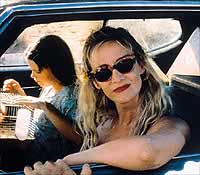

Comparisons are inevitable between Tumbleweeds and Anywhere But Here, two movies about a mother and a daughter moving to California in search of a better life. In both, the roles of mother and daughter are somewhat reversed, the mother tends to act like a child and the daughter is smarter, and exasperated at her mom's actions. The latter has bigger stars, a much larger budgets, came out first, and is not as good as the former. However, these are two separate movies, and should be treated as such. Tumbleweeds is the directorial debut of Gavin O'Conner and is based partially on the memoirs of Angela Shelton. Both of them wrote the script for the movie.
Mary Jo Walker (Janet McTeer, Velvet Goldmine, Waking the Dead) is somewhat of a drifter. She goes from one relationship to another, completely uprooting everything once a relationship ends. Unfortunately, this means that her daughter Ava (Kimberly J. Brown) is forced to follow wherever her mother goes; a virtual whirlwind tour of the American South. Mary Jo and Ava decide to move to California. There, Mary Jo meets Jack Ranson (O'Conner), a truck driver, and eventually moves in with him. Ava takes an instant disliking to Jack, who is gruff and short-tempered. While Ava begins settling in to her new life in California, Mary Jo is still the same person as before. When her relationship with Jack reaches a breaking point, she wants to again move on, but this time, Ava wants to stay.
McTeer is by far the best thing about this movie. She is a veteran British (impossible to tell) stage actors who is making her American film debut. Although Mary Jo seems to be occupied with her own foibles, underneath, her love for her daughter is what motivates her. Browning is also good in her motion picture debut. Also good is Jay O. Sanders (Music of the Heart, Earthly Possessions), in a subdued role as one of Mary Jo's coworkers. However, the only emotions in the story are anger and frustration. There is not really any outpouring of love between mother and daughter. At the end of the movie, something may be different, but then again, everything may be the same.